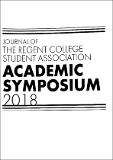Files in this item
Analysis of Stanley Hauerwas' theology in post-Umbrella Movement Hong Kong
Item metadata
| dc.contributor.author | Chu, Ann Gillian | |
| dc.date.accessioned | 2018-10-26T11:30:05Z | |
| dc.date.available | 2018-10-26T11:30:05Z | |
| dc.date.issued | 2018-03-02 | |
| dc.identifier | 256072857 | |
| dc.identifier | 234ec4f3-b3c6-4b71-99ca-2e350448ec53 | |
| dc.identifier.citation | Chu , A G 2018 , ' Analysis of Stanley Hauerwas' theology in post-Umbrella Movement Hong Kong ' , Paper presented at Regent College Academic Symposium , Vancouver , Canada , 2/03/18 pp. 14-22 . | en |
| dc.identifier.citation | conference | en |
| dc.identifier.other | ORCID: /0000-0002-2043-715X/work/49052311 | |
| dc.identifier.uri | https://hdl.handle.net/10023/16339 | |
| dc.description.abstract | This paper analyses Stanley Hauerwas’ theology in terms of how Christian ethics inform acts of civil disobedience. Before presenting its argument, this analysis first provides a working definition of the Christian view of civil disobedience as defined by Martin Luther King, Jr. It then argues that Hauerwas’ approach to civil disobedience would be that the church community contemplate what it means to be in Christ’s narrative, a process that involves Christology, ecclesiology, and eschatology. The paper presents its argument in these three parts. In regard to Christology, it argues that Christ’s narrative dictates the lives of Christians and includes acts of civil disobedience; thus Christians should focus on knowing who they are and are meant to be in Christ’s narrative, hastening the kingdom of God through non-violent, non-coercive, long-term communal relations that witness to the world at large. In regard to the church’s role in civil disobedience (ecclesiology), this section argues that the church as a community should remain focused on the manifestation of God’s kingdom as a slow witness to the world, rather than considering earthly political regimes at the forefront of Christian life and that the “church is church,” separate from political institutions. In regard to the individual Christian’s view of civil disobedience from now until the return of Christ (eschatology), the paper argues that Christians should have patience in the providence of God when facing earthly matters, considering that ends do not justify violent means, and that Christian conviction requires the transformation of the church community—a transformation that illuminates the world. This paper concludes that Hauerwas would argue that political decisions should be based on what it means to live as a Christian, rather than whether civil disobedience is right or wrong. | |
| dc.format.extent | 9 | |
| dc.format.extent | 7726436 | |
| dc.language.iso | eng | |
| dc.relation.ispartof | en | |
| dc.subject | BT Doctrinal Theology | en |
| dc.subject.lcc | BT | en |
| dc.title | Analysis of Stanley Hauerwas' theology in post-Umbrella Movement Hong Kong | en |
| dc.type | Conference paper | en |
| dc.contributor.institution | University of St Andrews. School of Divinity | en |
| dc.description.status | Peer reviewed | en |
This item appears in the following Collection(s)
Items in the St Andrews Research Repository are protected by copyright, with all rights reserved, unless otherwise indicated.

